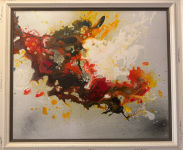SimonDoom
Kink Lord
- Joined
- Apr 9, 2015
- Posts
- 19,576
Apparently, the newest thing that's got everybody up in arms is Tilly Norwood, an AI "actress" that has suddenly made a splash in social media and has some real actors alarmed.
I haven't done enough homework on this issue to have much of an opinion, but it does have some interesting erotic implications. It's very easy to imagine the Internet becoming populated by AI erotic performers or partners with whom one can interact. The CGI is so good now that it is genuinely difficult to tell what's real and what's not.
Naturally, the stories gave me a plot bunny for an AI erotica performer and her adventures. Call her Jilly Pornwood.
I haven't done enough homework on this issue to have much of an opinion, but it does have some interesting erotic implications. It's very easy to imagine the Internet becoming populated by AI erotic performers or partners with whom one can interact. The CGI is so good now that it is genuinely difficult to tell what's real and what's not.
Naturally, the stories gave me a plot bunny for an AI erotica performer and her adventures. Call her Jilly Pornwood.

